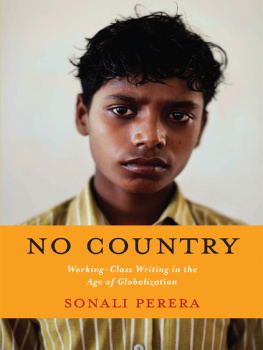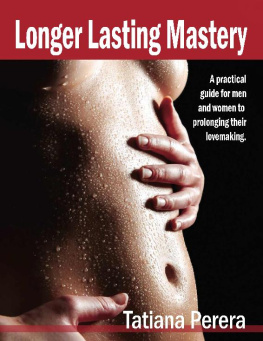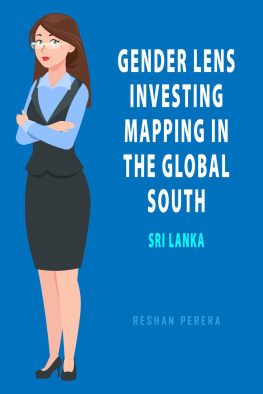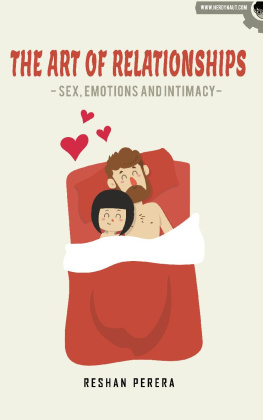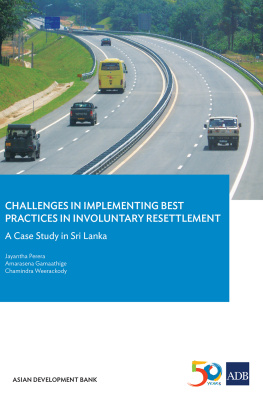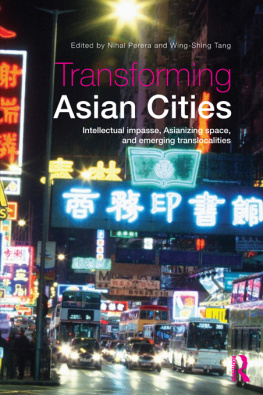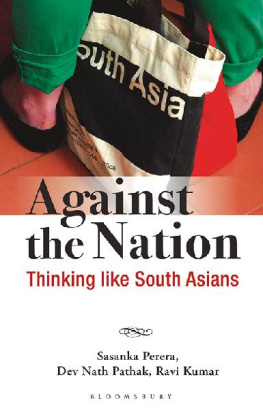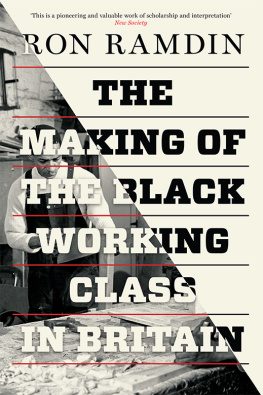No Country
No Country
Working-Class Writing in the Age of Globalization
SONALI PERERA
Columbia University Press
New York
Columbia University Press
Publishers Since 1893
New York Chichester, West Sussex
cup.columbia.edu
Copyright 2014 Columbia University Press
All Rights Reserved
E-ISBN 978-0-231-52544-2
Parts of chapter 3 are adapted from Sonali Perera, rethinking Working-Class Literature: Feminism, Globalization, and Socialist Ethics, Differences 19.1 (2008): 131.
Part of the introduction is adapted from Sonali Perera, Working-Class Writing and the Use Value of the Literary, which appeared in PMLA 127.4 (October 2012): 932938. Reprinted by permission of the copyright owner, The Modern Language Association of America.
Library of Congress Cataloging-in-Publication Data
Perera, Sonali, 1971
No Country : working-class writing in the age of globalization /
Sonali Perera.
pages cm
Includes bibliographical references and index.
ISBN 978-0-231-15194-8 (cloth : acid-free paper)
ISBN 978-0-231-52544-2 (electronic)
1. Working class writingsHistory and criticism. 2. Working class in literature. I. Title.
PN56.L22P47 2013
809.93355dc23
2013012758
A Columbia University Press E-book.
CUP would be pleased to hear about your reading experience with this e-book at .
Jacket design by Noah Arlow
References to websites (URLs) were accurate at the time of writing. Neither the author nor Columbia University Press is responsible for URLs that may have expired or changed since the manuscript was prepared.
For my parents, Joseph and Mallika Perera
and
For my grandmother, Sheila May Edirisinghe (19192002)
And could you not make a cameo of this and pin it onto your aesthetic hearts?
Tillie Olsen
Contents
Even as the culture of specific institutions changes and intellectual communities disband and re-form there is a sense of security and assurance in this thought: the U.S. academy is a much bigger spacebigger, too, in the sense of generousthan the fiefdoms of any one university or department. The collaborative works of the communities and other collectivities that define it and supplement it are wide ranging, transnational. At the risk of sounding like a liberal humanist, I will say it: to this Sri-Lankan-by-way-of-England, postcolonial/ immigrant academic, this nonplace, the U.S. academy, has always represented a hospitable home of sortsa space to live, breathe, dispute, and share ideas.
At Columbia University, I was incredibly fortunate to work closely with one of the most inspiring, generous, and challenging intellectuals in the U.S. academyGayatri Chakravorty Spivak. I am grateful to her for giving me so much of her valuable time. I thank her for being such a supportive mentor. I can only hope that these pages do justice, in some small measure, to her teaching, activism, and theory. As a junior faculty member, I have also had other mentors and friends who have helped me find my voice and my way and have given me critical feedback during crucial stages of this projects development. Heartfelt thanks to Josie Saldaa, David Eng, and Brent Edwards for always giving me the best advice.
This book would never have seen the light of day without the love, support, intellectual generosity, and wicked cool of a core group of friends and interlocutors. I thank Edlie Wong, Stacy Klein, Dominic Leggett, Chris Chism, and Suzanne Daly. Stacy, Edlie, Chris, and Dominic read the manuscript in various rough draft stages and offered insightful feedback and, when needed, unsparing criticism. David Golumbia, too, read much of the manuscript in its piecemeal incarnations. I thank him for his insights. This book is so much the better for the many, many conversations Ive had with these friends. Indrani Chatterjee gave me brilliant feedback and also showed me that, no matter the outcome, some institutional battles are worth fighting for. Love and respect to her.
At Columbia, Berkeley, Duke, and elsewhere there were also other teachers who gave me words and books to live by. I owe a huge debt of gratitude to Rob Nixon for introducing me to the amazing writings of Bessie Head. I also thank him for his wisdom and kindness and for making Columbia a hospitable place for graduate students working in the field of postcolonial studies. From Priscialla Wald, Rob Nixon, Gauri Viswanathan, Ann McClintock, Susan Schweik, Janet Adelman (RIP), Ojars Kratins, and David Lloyd I learned that it is not how we professionalize our graduate and undergraduate students but how we socialize them within the profession that matters. I thank Peter Hitchcock for introducing me to the right debates in British working-class studies during the preliminary stages of dissertation writing.
While this book was begun at Columbia, I firmly believe that it could only have been completed here at Hunter College of the City University of New York. I am grateful to my brilliant Hunter students for their challenging questions and their commitment to struggles for social justice. I learn from them each day. I thank these former graduate and undergraduate students at CUNY and elsewhere for their presence in my classes: Subha Dayal, Lauren Kollar, Stephanie Basile, Bretney Moore, Allison Shelton, Shakti Jaising, Anantha Sudhakhar, Sonali Barua, Nimanthi Perera-Rajasingham, Anthony Americo, Michelle Chan, Karen Gellen, Nami Shin, and Megan Paustian. But in order to thrive in this professionnot just survive itevery junior faculty member should also encounter a supportive feminist chair. I thank Cristina Alfar, my chair, for her integrity and goodness. Along with Barbara Webb, Jeremy Glick, Tanya Agathocleus, Janet Neary, Meena Alexander, Marlene Hennessy, Leigh Jones, Gavin Hollis, Ramesh Mallipeddi, Harriet Luria, Rupal Oza, Ruchi Chaturvedi, Jan Heller Levi, and Thom Taylor, she makes Hunter a joyous place to work.
A loving shout-out to my family in New York. During many days of writing and revising, I was sustained by sumptuous meals and political debates at the Bose-Patel household. My gratitude to Maneesha Patel, Satyajit Bose, and especially Tansen and Zaleh Bose-Patel for community and laughter.
At a crucial turning point in this books history, I was fortunate to find it had many supporters from across disciplines: Ed Cohen, Jasbir Puar, Julie Livingston, Sumit Guha, Michael McKeon, Matt Buckley, Richard Dienst, John McClure, Harriet Davidson, Abena Busia, Elin Diamond, Ellen Rooney, David Kazanjian, Ben Baer, Shuang Shen, Mary P. Sheridan-Rabideau, Minkah Makalani, Nancy Hewitt, Ethel Brooks, Carlos Decena, Nicole Fleetwood, Jackie Miller, Sandy Flitterman-Lewis, Val Daniel, Stephan Clingman, Stephane Robolin, Evie Shockley, Cheryl Wall, Vicky Unruh, Marianne Dekoven, Ritty Lukose, Ania Loomba, Bruce Robbins, Ranji Khanna, Srinivas Aravamudan, and Chandan Reddy. I thank these scholars for their encouragement. Their support has meant the world to me. Special thanks are due to a critical mass of Sri Lankanist scholars and activists for their spirit of camaraderie and collaboration: Ahilan Kadirgamar, Vasuki Nesiah, Fara Haniffa, Kitana Anand, Cenan Pirani, and Sharika Thiranagama. Kumari Jayawardena encouraged a clueless undergraduate researcher and set her on the right course very early on. I thank her for her uncompromising integrity and her incredible warmth and generosity of spirit. I thank Qadri Ismail for helpful criticisms offered up during the early stages of writing.

